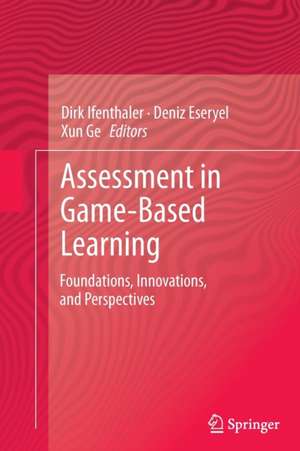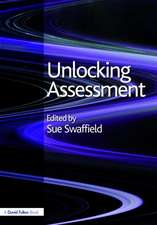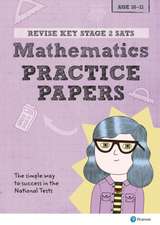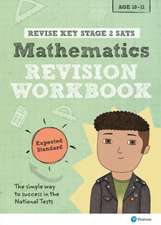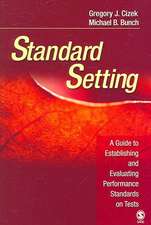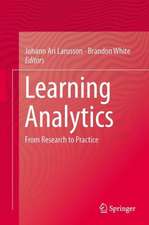Assessment in Game-Based Learning: Foundations, Innovations, and Perspectives
Editat de Dirk Ifenthaler, Deniz Eseryel, Xun Geen Limba Engleză Paperback – 17 iul 2014
| Toate formatele și edițiile | Preț | Express |
|---|---|---|
| Paperback (1) | 649.87 lei 6-8 săpt. | |
| Springer – 17 iul 2014 | 649.87 lei 6-8 săpt. | |
| Hardback (1) | 656.43 lei 6-8 săpt. | |
| Springer – 14 iun 2012 | 656.43 lei 6-8 săpt. |
Preț: 649.87 lei
Preț vechi: 764.55 lei
-15% Nou
Puncte Express: 975
Preț estimativ în valută:
124.37€ • 135.04$ • 104.47£
124.37€ • 135.04$ • 104.47£
Carte tipărită la comandă
Livrare economică 22 aprilie-06 mai
Preluare comenzi: 021 569.72.76
Specificații
ISBN-13: 9781489996015
ISBN-10: 148999601X
Pagini: 492
Ilustrații: XXVIII, 464 p.
Dimensiuni: 155 x 235 x 26 mm
Greutate: 0.68 kg
Ediția:2012
Editura: Springer
Colecția Springer
Locul publicării:New York, NY, United States
ISBN-10: 148999601X
Pagini: 492
Ilustrații: XXVIII, 464 p.
Dimensiuni: 155 x 235 x 26 mm
Greutate: 0.68 kg
Ediția:2012
Editura: Springer
Colecția Springer
Locul publicării:New York, NY, United States
Public țintă
ResearchCuprins
-Foundations of game-based assessment. - Are all games the same? –The role of construct definintion in the creation of formative assessments in game-based learning. –Games, learning and assessment. –Three things game designers need to know about assessment. –Technological and methodological innovations for assessing game-based learning. –Patterns of game playing behaviors as indicators of mastery. – Taking activity-goal alignment into open-ended environments: Assessment and automation in game-based learning. –Infomration trails: In-process assessment of game-based learning. – Timed report measures learning. –Driving assessment of students’explanations in game dialogue. –Assessing learning games for school content: A TPACK-PCARD framework and methodology. –Implementing game-based learning:The MAPLET framework as a guide to learner-centered design and assessment. – Innovative assessment technologies in educational games. –Realizing assessment in game-based learning. –Interactivity design and assessment framework for educational games to promote motivation and complex problem-solving skills. – Measurement principles for gaming. – Using institutional data to evaluate game-based instructional designs. – Examing students’ cultural identity and player styles through avatar drawings in a game-based classroom. – Measurement and analysis of learners’ motivation in game-based e-learning. – Assessment of students’ emotions in game-based learning. –Designing for participation in educational video games. – Computer games as preparation for future learning.
Recenzii
From the reviews:
“When applying video game technology to an educational process, one must ask how we know it is effective. Addressing that question is what this book is about. The book is an edited collection of 21 chapters divided into three parts … . Three outstanding strengths of the book lead me to highly recommend it. … This book would be of greatest interest to educators, academics, and researchers in game-based learning. … it will also provide valuable perspectives for video game designers.” (J. M. Artz, ACM Computing Reviews, October, 2012)
“When applying video game technology to an educational process, one must ask how we know it is effective. Addressing that question is what this book is about. The book is an edited collection of 21 chapters divided into three parts … . Three outstanding strengths of the book lead me to highly recommend it. … This book would be of greatest interest to educators, academics, and researchers in game-based learning. … it will also provide valuable perspectives for video game designers.” (J. M. Artz, ACM Computing Reviews, October, 2012)
Notă biografică
Dirk Ifenthaler’s research interests focus on the learning-dependent progression of mental models, complex problem solving, decision making, situational awareness, and emotions. He developed automated and computer-based methodologies for the assessment and analysis of graphical and natural language representations (SMD Technology, HIMATT, AKOVIA). Additionally, he developed components of course management software and an educational simulation games (DIVOSA, SEsim). He is also interested in the development of educational software and learning management systems (LMS) as well as technology integration into the classroom. Dr. Ifenthaler has published multiple books and book chapters as well as numerous articles in leading journals of the field. Dr. Ifenthaler is the current Fullbright Scholar in Residence at the Jeannine Rainboldt College of Education, University of Oklahoma.
Deniz Eseryel is an Assistant Professor in the Instructional Psychology & Technology Program at the University of Oklahoma. Her research focuses on issues related to learning, problem-solving, and expertise development in complex, ill-structured knowledge domains such as STEM. She is concerned with developing and evaluating new instructional approaches for advanced computer-based learning environments to facilitate development of complex learning and problem-solving outcomes.
Xun Ge is an Associate Professor with the Program of Instructional Psychology and Technology, Department of Educational Psychology, at the University of Oklahoma. She holds a Ph.D. in Instructional Systems from the Pennsylvania State University. Dr. Ge’s primary research interest involves scaffolding student complex and ill-structured problem solving and self-regulated learning through designing and developing instructional scaffolds, learning technologies, and open learning environments. Dr. Ge has published multiple book chapters and numerous articles in leadingjournals of the field, and she is recognized for the two awards – 2003 Young Scholar by Educational Technology Research & Development and 2004 Outstanding Journal Article by Association for Educational Communications and Technology.
Deniz Eseryel is an Assistant Professor in the Instructional Psychology & Technology Program at the University of Oklahoma. Her research focuses on issues related to learning, problem-solving, and expertise development in complex, ill-structured knowledge domains such as STEM. She is concerned with developing and evaluating new instructional approaches for advanced computer-based learning environments to facilitate development of complex learning and problem-solving outcomes.
Xun Ge is an Associate Professor with the Program of Instructional Psychology and Technology, Department of Educational Psychology, at the University of Oklahoma. She holds a Ph.D. in Instructional Systems from the Pennsylvania State University. Dr. Ge’s primary research interest involves scaffolding student complex and ill-structured problem solving and self-regulated learning through designing and developing instructional scaffolds, learning technologies, and open learning environments. Dr. Ge has published multiple book chapters and numerous articles in leadingjournals of the field, and she is recognized for the two awards – 2003 Young Scholar by Educational Technology Research & Development and 2004 Outstanding Journal Article by Association for Educational Communications and Technology.
Textul de pe ultima copertă
The capabilities and possibilities of emerging game-based learning technologies bring about a new perspective of learning and instruction. This, in turn, necessitates alternative ways to assess the kinds of learning taking place in the virtual worlds or informal settings. Aligning learning and assessment is at the core of creating a favorable and effective learning environment, one that is learner-centered, knowledge-centered, and assessment-centered.
However, how do we know students have learned in games? What do we assess, and how do we assess students’ learning outcomes in a game-based learning environment? After a critical literature review, the authors discovered that there is a missing link between game-based learning and game-based assessment, particularly in assessing complex problem solving processes and outcomes in a digital game-based learning environment.
This edited volume bridges the gap by providing that missing link. It covers the current state of research, methodology, assessment, and technology of game-based learning. The contributions from international distinguished researchers present innovative work in the areas of educational psychology, educational diagnostics, educational technology, and learning sciences. Included chapters are organized into three major parts: (1) Foundations of game-based assessment, (2) technological and methodological innovations for assessing game-based learning, and (3) realizing assessment in game-based learning. It provides theoretical research, translational resaerch, and guided practice---all in one volume. This book will prove invaluable to anyone who is performing research or working the the field--it provides a springboard from theory to practice, offering a map for anyone hoping to implement game-based assessment into their institution as well as to primary researchers and developers.
However, how do we know students have learned in games? What do we assess, and how do we assess students’ learning outcomes in a game-based learning environment? After a critical literature review, the authors discovered that there is a missing link between game-based learning and game-based assessment, particularly in assessing complex problem solving processes and outcomes in a digital game-based learning environment.
This edited volume bridges the gap by providing that missing link. It covers the current state of research, methodology, assessment, and technology of game-based learning. The contributions from international distinguished researchers present innovative work in the areas of educational psychology, educational diagnostics, educational technology, and learning sciences. Included chapters are organized into three major parts: (1) Foundations of game-based assessment, (2) technological and methodological innovations for assessing game-based learning, and (3) realizing assessment in game-based learning. It provides theoretical research, translational resaerch, and guided practice---all in one volume. This book will prove invaluable to anyone who is performing research or working the the field--it provides a springboard from theory to practice, offering a map for anyone hoping to implement game-based assessment into their institution as well as to primary researchers and developers.
Caracteristici
Provides both International collaborations and current perspectives on assessment in game-based learning Contributions solicited from a wide variety of educational and psychological researchers, engineers, instructional designers, and computer scientists Combines works focusing on theoretical foundations with practical applications
